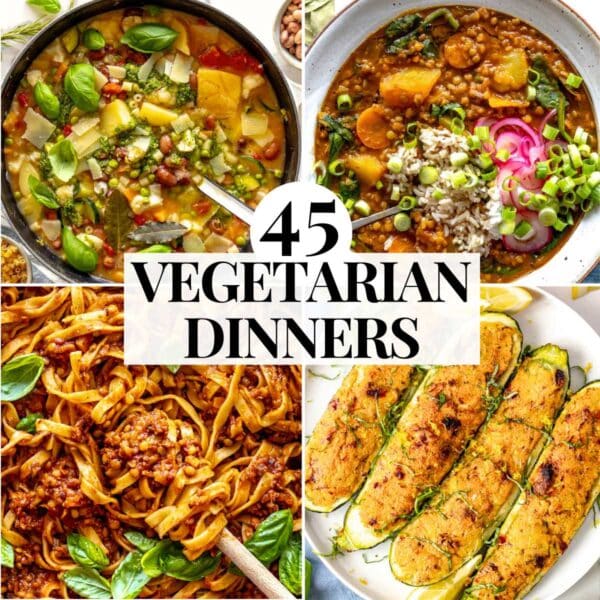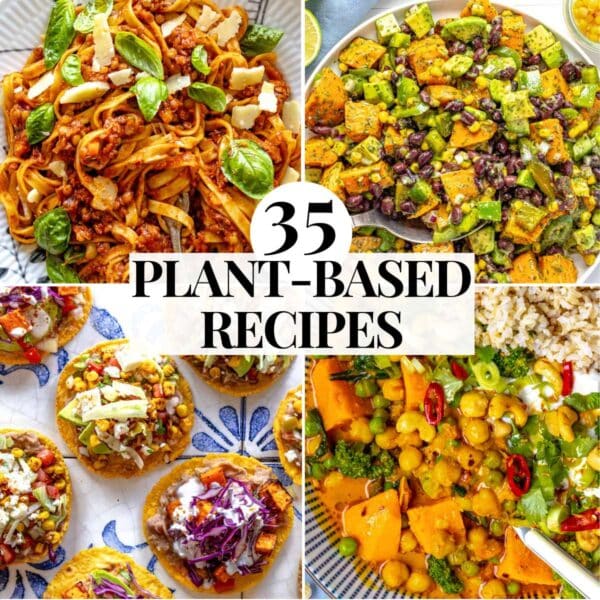With a single bite, you’ll taste the essence of North African cuisine: aromatic spices, crunchy nuts, and sweet dried fruits softened by fluffy couscous grains. Dietary Note: this recipe is suitable for a vegetarian and vegan diet. Not suitable for a gluten-free diet.
Moroccan couscous video
Ingredients & Substitutions
How to make Moroccan couscous
Serving suggestions
Variations
Questions
Storage & Make Ahead
More Moroccan-inspired recipes
Similar recipes
It’s made with small steamed granules of semolina, the same ingredient used to make dry Italian pasta. For convenience, most Western supermarkets sell pre-cooked and dried Moroccan couscous, which means that making it at home is a matter of minutes. It’s a great alternative to pasta or rice. In Morocco they eat couscous like we would eat bread or pasta. It has a neutral flavor that lends itself well to various toppings and sauces. It’s usually put at the center of the table, accompanied by a variety of small dishes, tagines, stews, grilled meats and vegetables, spreads, and sauces. Here, we’ll show you how to make a simple and authentic Moroccan couscous recipe that harmoniously combines sweet, sour, savory, and aromatic flavors from spices, dried fruits, and nuts. You can serve this as an appetizer, side dish, and even as a main. It’s excellent for meal prep as it keeps well for days.
Couscous
By couscous we mean Moroccan couscous, not Israeli couscous. Moroccan couscous looks like small granules of sand, whereas Israeli couscous looks more like tiny pearls of pasta. You’ll find Moroccan couscous in most if not all, western supermarkets. They sell it pre-steamed and dried, meaning you only have to rehydrate it with hot water or vegetable broth, and it’s ready to eat.
Extra virgin olive oil
We use extra virgin olive oil to flavor the couscous and toast the dried fruits and nuts. In Moroccan cuisine, they use three main types of fats for cooking. Extra virgin olive oil, butter, ghee, or smen, a salted fermented butter with an intense flavor. In this recipe, you can substitute melted butter, ghee, or smen for extra virgin olive oil.
Dried Fruits
Dried fruits are an integral part of Moroccan cuisine. You can pick and mix your favorites. We recommend:
Dates Dried apricots Raisins
Other dried fruits you can use are dried prunes, figs, and currants.
Nuts
Like dried fruit, nuts are another essential ingredient in Moroccan cuisine. You can pick and mix your favorites. We recommend:
Pistachios: best if not salted. Almonds: best if slivered or shaved. Pinenuts
Other nuts you can use are walnuts, hazelnuts, and peanuts.
Spices
We recommend:
Cinnamon Cumin: ground. Saffron or turmeric: optional, to color the couscous with a vibrant yellow hue. Salt: best if sea salt or kosher salt.
Fresh herbs and lemon juice
Use fresh flat-leaf or Italian parsley. Substitute fresh coriander (cilantro) or fresh mint for parsley. Optionally you can squeeze some fresh lemon juice on the couscous before eating.
Rehydrate the couscous
Boil the water or vegetable broth in a kettle or a small pot on the stove. Add the saffron powder (or turmeric powder) and salt to a large mixing bowl and dissolve them with 2 tablespoons of boiling water. Add the couscous and pour in the remaining boiling water/broth. Stir with a fork and make sure to submerge the couscous in water. Set aside for 10 minutes. Now, rake the couscous with a fork to separate its grains and fluff it up. Add fresh parsley and extra virgin olive oil and toss until well combined, then taste and adjust for salt. Tip: traditionally, couscous is tossed by hand so you can easily feel and separate the grains. However, you can also do it with a spoon.
Prepare the nuts and dried fruits.
While the couscous rehydrates, chop the dates, dried apricots, and shelled pistachios into small pieces Tip: remove the pit from the dates if there’s any. Heat the olive oil in a skillet. Add the slivered almonds and toast them on medium-low heat for 2 minutes. Add chopped pistachios, pinenuts, apricots, dates, cumin, and cinnamon, and toast for 2 more minutes. Set three tablespoons of the mix aside. Add the rest to the bowl with the couscous and toss until well combined. Tip: reheat the couscous in a microwave for 1 minute if it gets cold. Top with the reserved fruits and nuts mix and serve in the center of the table. Tip: traditionally, powdered sugar is added on top, alternating a stripe of cinnamon with one of powdered sugar. We don’t do this, as we think the dish is sweet enough from the dried fruit.
Moroccan couscous as an appetizer
You can eat Moroccan couscous as an appetizer, something like a mezze platter or tapas. Put the couscous at the center of the table and serve spreads, dips, veggies, and sauces to go with it. This can, of course, turn into a delicious and fun dinner if you add enough dishes to go with it. We recommend tying it with:
Shirazi salad: a delicious and refreshing cucumber and tomato salad. Moroccan carrot salad: with tender boiled carrots and spices. Zaalouk: a tender and creamy moroccan eggplant dip. Hummus and falafel. Tzatziki: a Mediterranean yogurt and cucumber sauce. Baba ganoush or mutabal: both delicious eggplant dips.
Moroccan couscous as a main dish
Moroccan couscous can serve as the canvas for a delicious dinner like pasta or rice.
Shirazi Salad
Zaalouk (Moroccan Eggplant Dip)
Moroccan Carrot Salad
Hummus
Pile it on a large plate, make a well in the center, and top it with one of the following dishes:
Carrot lentil salad Moroccan carrot salad Roasted sweet potato salad Lentil cauliflower salad Sweet potato and lentil salad Cauliflower tahini salad
We recommend serving it with a few dollops of Greek-style or non-dairy yogurt, labneh, yogurt tahini sauce, crumbled feta, a squeeze of lemon, or a drizzle of tahini sauce. Check out our couscous with vegetables.
Couscous salad with chickpeas
Crunchy seasonal vegetables, nutty chickpeas, and a tangy lemon and olive oil dressing. Our couscous salad with chickpeas is the perfect potluck, lunchbox, and picnic recipe. Check out our couscous salad.
Couscous with seven vegetables
This traditional couscous dish varies based on local traditions and seasonality. What’s true across the Maghreb region (Algeria, Libya, Mauritania, Morocco, and Tunisia) is that the number seven brings good luck. You can make this with seven of your favorite vegetables. We recommend yellow or red onions, carrots, potatoes, zucchini, celery, red bell pepper, leeks, tomatoes, sweet potatoes, butternut squash, and garlic. Simmer the chopped veggies with some vegetable or chicken broth until tender. Season with harissa, salt, black pepper, and spices like ground cumin, coriander, bay leaves, and rosemary. Serve them on top of a plate of couscous. Refrigerator: keep leftovers in the fridge in an airtight container for 4 days. Freezer: we don’t recommend freezing it. Reheat: you can serve it refrigerated, at room temperature, or warm it in a microwave for 1 minute.
Carrot raisin salad Eggplant zaalouk Carrot lentil salad Chickpea stew Moroccan carrot salad
Zaalouk (Moroccan Eggplant Dip)
Cauliflower Lentil Salad
Carrot Salad
Chickpea Stew
How to cook couscous
Farro Salad
Rice Salad
Barley Salad
Mediterranean Diet Recipes
25 Easy Grain Bowl Recipes
45 Easy Vegetarian Dinner Recipes
35 Plant-based Recipes









































